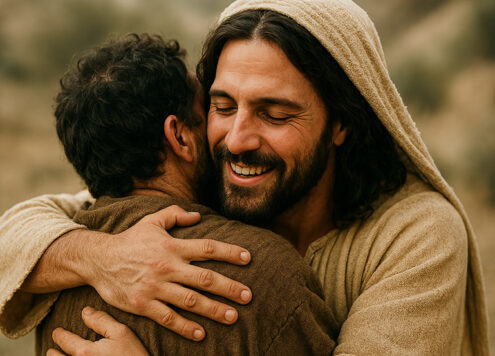Today I want to write about joy. What is it? Is it the same as happiness? Joy and happiness may appear to be the same, but they’re not. They can exist or coexist together, but they are different.
Happiness is circumstantial. It comes from outside a person whereas joy comes from within. Joy is an abiding sense of wellbeing. It is deeply felt and you can carry it around with you wherever you go, and whatever the circumstance in which you find yourself. Everybody experiences trials or persecution in life, but it is possible to maintain your interior joy in spite of these weighty challenges. Trials are not the same as temptations which occur when you are dragged away by your own selfish desires. Trials are part and parcel of life, and have to be endured even when they befall you through no fault of your own. Trials help to refine your character like gold in a furnace. They help to develop perseverance; they make you mature and complete (James 1 : 2-4). Trials are something we can face with Joy.
To be happy, something has to happen to you. For example, you are happy because you are able to buy a new home. You are happy when you watch your favorite sporting event on television. You are happy when you are fishing. You are happy if you have money in the bank and can afford whatever you need. Yet, you can have all these things and not be satisfied. Why is this? The reason is that we long for something deeper than fleeting pleasures. Happiness is a passing emotion or as Eleanor Roosevelt famously said, “Happiness is a by-product.” It does not satisfy the restlessness of the human heart. St. Augustine explains the quest for completeness another way: “We are made for you, Oh Lord, and our hearts are restless until they rest in you.”
One of the ironies about joy and what distinguishes it from happiness is that it can co-exist alongside human sorrow caused by trials or persecution in life. Kahlil Gibran, known as the prophet, asserts that joy and sorrow are inseparable and “the deeper sorrow carves into your being the more joy it can contain.” Wow! A mother experiences sorrow at giving birth, but that does not rob her of the intense joy of bringing new life into the world. On the cross, Jesus experienced great sorrow, but that did not dim his joy of completing his glorious mission of saving and redeeming humankind.
Joy is a gift, and it comes from within a person. C. S. Lewis writes about this longing for joy in his autobiography, ‘Surprised by Joy’ after he converted to Christianity.
The Lord tells us he wants our joy to be complete ( John 15 : 11 ). What does this mean? Surely it means that the joy the Lord offers is permanent and cannot be dampened even by human sorrow.
Its important to cultivate the gift of joy. Christmas is a busy time. It is a stressful time also for many. No matter how much you do to please others, even your children, you can never do enough to satisfy their restless spirits.
The gift of joy, that calm centeredness that dispels the gloom, is a gift of the Holy Spirit. Ask the Holy Spirit to give it to you. There is no better gift to share with others at any time of the year. You cannot always be happy, but you can always be joyful.
The most joyful people don’t have to have the best of everything. They just know how to make the best of everything.
—Fr. Hugh Duffy











3 Comments
Tom Walsh
Thank you Fr. Hugh for your sharing on the difference between Joy and Happiness. I have never stopped to think about this before and it makes perfect sense. In particular I like the following piece from your sharing.
” You cannot always be happy, but you can always be joyful.The most joyful people don’t have to have the best of everything. They just know how to make the best of everything”
David Page
A wonderful example of JOY, much different than happiness. You can see in the faces of those not expecting this musical gathering a sense of joy.
Elsa Tarlit
Thank you father for sharing with us the difference between joy and happiness. Now I understand the meaning of each one.